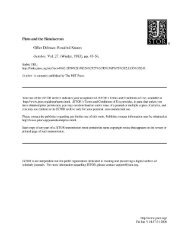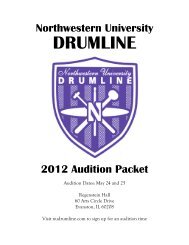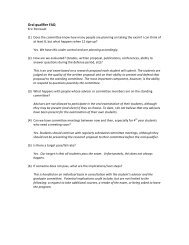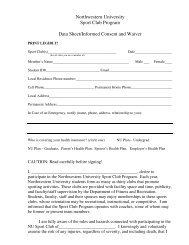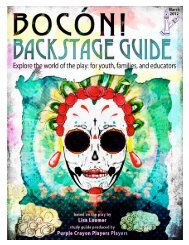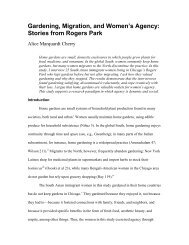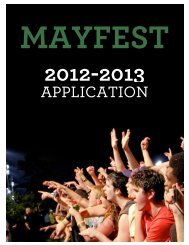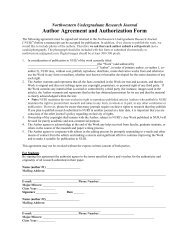research - Associated Student Government, Northwestern University
research - Associated Student Government, Northwestern University
research - Associated Student Government, Northwestern University
Create successful ePaper yourself
Turn your PDF publications into a flip-book with our unique Google optimized e-Paper software.
RESEARCHgious and ethnolinguistic communities of India, Nehru,an idealistic but pragmatic leader, believed democraticrule could reestablish and further entrench the “toleranceof heterodoxy and pluralism”, which had allowed these elementsto coexist for two millennia. 13 In a speech entitled“Free India is One Year Old”, he called on his countrymento “build up a free and democratic India, where theinterest of the masses of our people has always [been] thefirst place to which all other interests must submit”. 14 Hecontinued that “Freedom has no meaning unless it bringsrelief to these masses from their many burdens. Democracymeans tolerance, tolerance not merely of those whoagree with us, but of those who do not agree with us”. 15 Inthe years following this speech, Nehru, who was part ofthe Constituent Assembly, worked with his colleagues toincorporate these principles into India’s Constitution.Using the Constitution to establish democratic ruleUsing the Constitution, Nehru and his colleagues inthe Constituent Assembly tried to manage the problemof heterogeneity, which often hampers democratization.They incorporated various ‘provisions’ into the Constitutionin order to address the concerns of these diversecommunities and prevent the rise of the divisive politicalentrepreneurs. The various ethnolinguistic and religiousgroups of India, particularly minorities, were providedwith full protection under the law, the abilities togovern their cultural and religious affairs, proportionalrepresentation in the parliament and cabinets, and evena minority veto, which would allow minorities to “blockany attempts to eliminate or reduce” their autonomy. 16Truly, their efforts, particularly Nehru’s, helped to furthertransition India into democratic rule.Support for democratic rule fromthe Indian electorateThe Indian electorate has reinforced Nehru’sdecision to pursue democracy over time, particularlywhen they ousted his daughter from office in 1977.Two years before this incident, Prime Minister Gandhideclared a state of emergency, whence she suspended“all political freedoms” such as the freedom of speechand participation in elections and the parliament, arrestedall political dissidents, and subjected the lowerclasses to forced sterilization and housing demolitioncampaigns. 17 Convinced the members of the oppositionwere actively trying to oust her from power afterthey had accused her of fraud, tried to assassinate her,and succeeded in assassinating a minister in her government,she announced that “some authoritarianism wasneeded to thwart a ‘deep-rooted conspiracy that wouldhave ‘led to economic chaos and collapse’”. 18However, making a surprising move on January 18,1977, Gandhi declared that elections would be held laterthat year as India had achieved some measure of political‘stability’. Because the election date had been set for themiddle of March, only two months after she had madethe announcement, Gandhi assumed she would easilywin and thereby solidify her rule. 19 After all, the oppositionparties were deeply divided on key issues and werenot given enough time to unite against her. To her surprise,several of these national and regional parties thatformed the opposition joined together to form a coalitioncalled the Janata Alliance under the leadership of her oldfoe, Morarji Desai. Fearing “an electoral defeat [againsther] would probably ensure the institutionalization ofauthoritarian measures”, the parties in the Janata Alliancenot only united against Gandhi but also turned the electioninto a referendum on authoritarianism. 20The results of the election, in which 194 millionpeople out of 320 million registered voters turned out tothe polls, resulted in an overwhelming defeat for PrimeMinister Gandhi. Her opponents in the Janata Alliancewon 51 percent of the popular vote while Gandhi’sCongress Party received 30 percent and their first defeatin Indian history. 21 The Janata Alliance also swept electionsin the northern Indian states such as “Haryana,Himachal Pradesh, Rajasthan, Orissa and Delhi”, whichhad been a Congress Party stronghold for decades andachieved significant majorities in the south. 22 Moreover,Prime Minister Gandhi lost her parliamentary seat inRae Bareli district by a margin of 55,000 votes. 23The election results clearly demonstrate the Indianelectorate’s discontent with authoritarian policies in additionto their commitment to democratic rule. BecauseGandhi had suspended political freedoms such as thefreedom of speech and participation in elections andclosed parliament, the Indian electorate could neither influencethe creation of public policies nor remove them ifthey were unfavorable; thus, they were made to suffer dueto harmful policies such as forced sterilization and urbanhousing demolition. 24 In addition to their dissatisfactionwith authoritarian policies, the Indian electorate also feltcommitted to democratic rule as it best safeguarded theirrights. Under the authoritarianism, certain governmentofficials often denied the public crucial services if they didnot conform to harmful government policies. 25 In contrast,democratic rule would allow them to restore theirpower over elected officials: “the decline of the elected officialmade the vulnerable to arbitrary authority, and thateven corrupt elected officials [who could be voted out ofoffice] were preferable to the authoritarian regime underwhich they were now living”. 26SingaporeLike India, newly independent Singapore also facedserious challenges. After Singapore left the Malaya Federationin 1965, which they joined shortly after theirindependence from Great Britain two years prior, Leeturned to authoritarianism to remedy a number ofproblems facing the state including communalism. Inhis memoirs, he describes that people fleeing communal10 NORTHWESTERN UNDERGRADUATE RESEARCH JOURNAL




